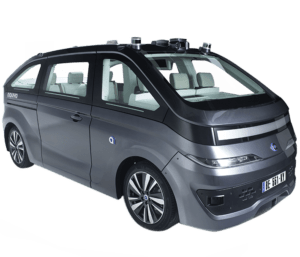News
The fight against Copenhagen’s congestion problems starts with the driverless Autonom Cab
This article is more than 8 years old.
NAVYA’s Paris announcement excites an industry undergoing rapid transition

This robust, sleek vehicle could be on sale as early as July 2018 (photo: navya.tech/en)
It is well documented that Copenhagen faces a serious need for traffic solutions as the population continues to rapidly grow and roads get more congested.
Research suggests the use of autonomous vehicles would free up 30 percent more space on the roads in cities, as vehicles can drive closer together without risk of accident.
And according to an announcement last night in Paris, that future could be nearer than you think, as the autonomous technology firm NAVYA has confirmed it will be shortly introducing the first ever autonomous taxi: the Autonom Cab.
“We no longer have freedom behind the wheel of a car,” explained Christophe Sapet, the French entrepreneur founder of NAVYA.
Just a matter of quarters
NAVYA’s new tagline ‘Be fluid’ encompasses the idea that the taxi will provide more personal autonomy to city dwellers, whilst accounting for fewer emissions, accidents and congested roads. In short, it will “release humankind from automobile dependency”, promises Sapet.
Ultimately, it wants to be part of a faster, more efficient autonomous transportation system that around 50 percent of a city’s population will be using in their daily lives within ten year from now.
In fact, it is significant, adds Sapet, that the industry no longer talks in terms of years, but quarters, such is the speed of growth and closeness of transition.
Six cameras, ten sensors, four radars
The taxi, which will be sold worldwide, is an electric, six-person vehicle with no driver, steering wheel, cock pit, or pedals.
It uses six cameras to read traffic signs and navigate obstacles, ten lidar sensors to perceive dimensional surroundings and positioning using 3D mapping, four radars to calculate the speed of surrounding objects, and 4G technology that allows the vehicle to communicate with human-based supervision centres.
Emphasis is also paid to personal comfort as the taxi offers customers a music playlist as well as interactive cultural information via the NAVYA APP.
Testing will take place this coming April and the vehicle is scheduled to go on sale in July.
Exciting times for Denmark
The announcement ties in with recent developments in Denmark. Just last week, the new DCAKI working space opened at the University of Copenhagen.
Dedicated to discovering advances in AI, DCAKI is hopeful it can attract innovative companies and researchers in its quest for intelligent urban development solutions, and NAVYA will be high on its list.
The minister of transport, Ole Birk Olesen, is on board with the transition. “We can’t ignore the gradual development taking place in self-driving car technology,” he said earlier this year.










































